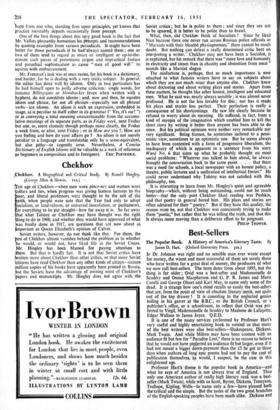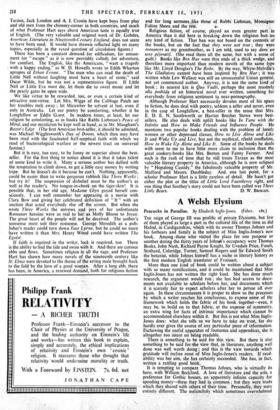Best-Sellers
IF Dr. Johnson was right and no sensible man ever wrote except for money, the wisest and most successful of them are surely those who have written for a great deal of money, the producers of what we now call best-sellers. The term dates from about 1895, but the thing is far older ; Ovid was a best-seller and Mademoiselle de Scudery and Ossian Macpherson and G. P. R. James and Marie Corelli and George Ohnet and Karl May, to name only some of the dead. It is strange how one's mind recalls so easily the best-sellers that are, from the point of view of absolute literary merit, not quite out of the top drawer ! It is consoling to the neglected genius toiling in his garret at the B.B.C., or the British Council, or a publisher's office, or a schoolroom, to reflect that Ovid was pre- ferred to Virgil, Mademoiselle de Scudery to Madame de Lafayette, Edgar Wallace to James Joyce. Q.E.D.
It is one of the many services rerformed by Professor Hart's very useful and highly entertaining book to remind us that many of the best writers were also best-sellers—Shakespeare, Dickens, Mark Twain. And while Milton may have been content with an audience fit but few for" Paradise Lost," there is no reason to believe that he would not have preferred an audience fit but larger, even if it had not meant a bigger down-payment than the £5 he got in those days when authors of long epic poems had not to pay the cost of publication themselves, as would, I suspect, be the case in this enlightened age.
Professor Hart's theme is the popular book in America—and what he says of America is not always true of England. Thus only one American author of really high literary rank was a best- seller (Mark Twain), while with us Scott, Byron, Dickens, Tennyson, Trollope, Kipling, Wells—to name only a few—have pleased both thetritical and the simple. But the tastes of the two great branches of the English-speaking peoples have been much alike. Dickens and
Tarzan, Jack London and A. J. Cronin have kept boys from play and old men from the chimney-corner in both countries, and much
of what Professor Hart says about American taste is equally true of English. (The very valuable and original work of Dr. Gohdes, American Literature in Nineteenth-Century England. does not seem to have been used. It would have thrown reflected light on many topics, especially in the vexed question of circulation figures.)
There has been a constant demand -for edification, for amuse- ment (or " escape " as it is now peevishly called), for adventure, for comfort. The English, like the Americans, "want a tragedy
with a happy ending," as W. D. Howells wrote to Edith Wharton apropos of Ethan Frame. "The man who can read the death of Little Nell without laughing must have a heart of stone," said Oscar Wilde, but he was not a representative figure. If Little Nell or Little Eva must die, let them die to sweet music and let the pearly gates be open wide.
We like virtue to be rewarded, too, or even a certain kind of attractive non-virtue. Let Mrs. Wiggs of the Cabbage Patch see her troubles melt away ; let Micawber be solvent at last, even if only in Australia. Let our poetry be comforting, whether it be Longfellow or Eddie Gaest. In modern times, at least, let our
religion be comforting, as in books like Rabbi Liebman's Peace of Mind, and our mysticism be kept well in hand, as in Mr. Maugham's Razor's Edge. (The first American best-seller, it should be admitted, was Michael Wigglesworth's Day of Doom, which then may have been read with the fascinated half-sceptical faith with which we read of bacteriological warfare or the newest tract on universal famine.)
But it is easy, too easy, to be funny or superior about the best- seller. For the first thing to notice about it is that it takes talent of some kind to write it. Many a serious author has dallied with the temptation to climb down, to get a little easy money by writing tripe. But he 'doesn't do it because he can't. Nothing, apparently,
could be easier than to write gorgeous rubbish like Three Weeks ;
but try it! The suspension of disbelief must be the author's as well as the reader's. No tongue-in-cheek on the tiger-skin! It is possible that, in her old age, Madame Glyn guyed herself con- sciously. I can well remember her appearing in a movie with Clara Bow and giving her celebrated definition of " It " with an unction that acted everybody else off the screen. But when she
wrote Three Weeks the sorrows and joys of her unfortunate Romanov heroine were as real to her as Molly Bloom to Joyce.
The great heart of the people will not be deceived. The author's nonsense must suit their nonsense. George Meredith as a pub- lisher's reader could turn down East Lyrne, but he could no more have written it than Mrs. Henry Wood could have written The Egoist.
If faith is required in the writcr, luck is required, too. There is the ability to find the tide and swim with it. And there are curious
ebbs and flows. Sometimes religion is all the rage, and Professor Hart has shown how many novels of the nineteenth century like St. Elmo were devoted to the theme of the erring male brought back to the fold by the love of a good woman. After a long ebb, there has been, in America, a renewed demand, both for religious fiction
and for long semaonsiike those of Rabbi Liebman, Monsignor Fulton Sheen and the rest.
Religious fiction, of course, played an even greater part in America than it did here in breaking down the religious ban on any kind of fiction. That ban was not based on the contents of the books, but on the fact that they were not true; they were romances as my grandmother, so I am told, used to say dans un sens pijoratif. (She read them all the same, -but with a sense of guilt.) Books like Ben Hur were thin ends of a thick wedge, and therefore more important than modern novels of the same type like Mr. Lloyd Douglas's The Robe. By the way, Whyte-Melvitle's The Gladiators cannot have been inspired by Ben Hur ; it was written while Lew Wallace was still an unsuccessful Union general. not yet commenced author. Anyway, it is not the same kind of book ; its nearest kin is Quo Vadis, perhaps the most masterly olla podrida of an historical novel ever written, something for everybody from religious sentiment to near-pornography.
Although Professor Hart necessarily devotes most of his space to fiction, he does deal with poetry, seldom a seller and never, even in the cast of Longfellow, a best-seller in the sense that Mrs. E. D. E. N. Southworth or Harriet Beecher Stowe were best- sellers. He also deals with uplift books like In Tune with the Infinite and How to Make Friends and Influence People. He mentions two popular books dealing with the problem of lonely women or other depressed classes, How to Live Alone and Like It and Wake Up and Live, but not the mythical, ribald conflation, How to Wake Up Alone and Like It. Some of the books he deals with seem to me to have little more claim to inclusion than the great cookery-books like Mrs. Beeton and Fanny Farmer. And such is the rush of time that he still treats Tarzan as the most valuable literary property in America, although he is now eclipsed by " liopalong Cassidy," the fabulously valuable property of Mr. Mulford and Messrs. Doubleday. And. one last point, for a scholar Professor Hart is a little careless of detail. He hasn't got either the plot or the titles of Little Lord Fauntleroy right, and one thing that Southey's story could not have been called was Three



































 Previous page
Previous page